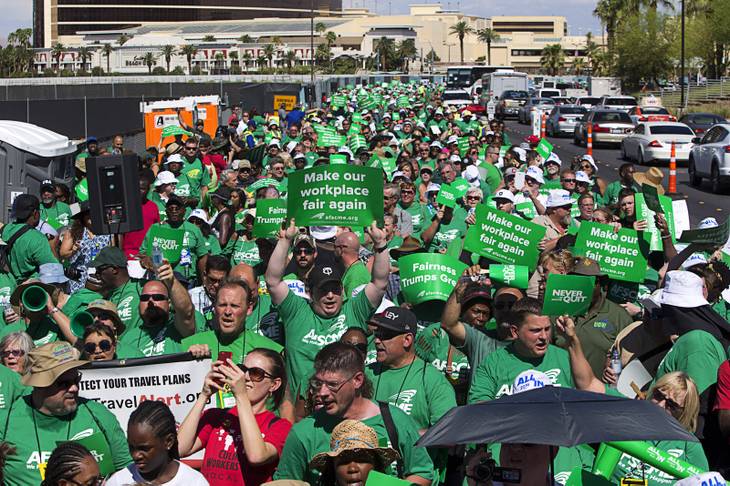The Culinary Union this week will conduct its first citywide strike vote in more than 15 years, but a vote to strike by a majority of 50,000 hospitality workers doesn’t necessarily mean a crippling walkout is imminent at dozens of Las Vegas casinos and hotels.
Tuesday’s vote, which is scheduled to take place from 10 to 11 a.m. and 6 to 7 p.m. at the Thomas & Mack Center, seeks the approval of the union’s rank-and-file members in Clark County — cocktail servers, bartenders, housekeepers, food servers, porters, bellmen, cooks and other kitchen workers — to authorize Culinary’s negotiating committee to call for a strike any time after June 1, the day the current union contract expires.
In all, 34 resorts along the Strip and downtown would be affected, including those operated by MGM Resorts International, Caesars Entertainment Corp., Penn National, Golden Entertainment and Boyd Gaming. About 80 percent of the workers eligible to vote Tuesday are employed by either MGM or Caesars.
Properties with expiring Culinary Union contracts
Here are the 34 resorts that have contracts with Culinary Union workers that expire at midnight May 31:
Operated by Caesars Entertainment on the Strip:
• Bally’s
• Caesars Palace (including Nobu)
• Flamingo
• Harrah’s
• Paris Las Vegas
• Planet Hollywood
• The Cromwell
• Linq
Operated by MGM Restorts International:
• Aria
• Bellagio
• Circus Circus
• Excalibur
• Luxor
• MGM Grand
• Mandalay Bay (including Delano)
• Mirage
• Park MGM
• New York-New York
Other resort corridor properties:
• Four Seasons
• SLS (including W Hotel)
• Stratosphere
• Treasure Island
• Tropicana
• Westgate Las Vegas
Downtown properties:
• Binion’s
• Fremont
• Main Street Station
• Four Queens
• Golden Gate
• Golden Nugget
• The D
• Downtown Grand
• Plaza
• El Cortez
“This is the union’s way of demonstrating their solidarity and showing they’re serious about negotiations,” said Ruben Garcia, professor at UNLV’s Boyd School of Law. “June 1 is not necessarily a hard deadline.”
The last time Culinary Union members staged a citywide stoppage was in 1984, when 15,000 workers went on strike and collectively lost an estimated $75 million in wages and benefits over a 67-day period, according to Las Vegas Sun archives. Individual properties have also had workplace stoppage through the years, most notably a more than six-year strike in the 1990s at the Frontier.
Bill Werner, an associate professor in UNLV’s College of Hospitality, said both casino and worker losses would be exponentially higher in 2018 with more than triple the amount of workers threatening to strike. A potential strike would extend beyond casinos to other businesses in the resort corridor, like restaurants and bars, as well as golf courses, taxi services, ride-sharing companies and the Las Vegas Convention Center, he said.
Culinary Union spokeswoman Bethany Khan said she couldn’t release specifics of the union’s compensation proposals because the negotiations aren’t public.
“We believe our proposals are fair, considering the companies are in better position and the recession is over,” Khan said. “The workers who have helped make those companies succeed should not be left behind.”
Khan said new issues and complexities in the most current contract proposals have caused additional setbacks in negotiations. In addition to requesting higher wages, the union is also seeking more stringent policies against sexual harassment of workers by guests, and protections including a “panic button” for housekeepers to push if they’re being attacked or threatened.
MGM spokeswoman Mary Hynes and Caesars spokesman Rich Broome last week both reiterated beliefs that the casino operators would reach a “mutually beneficial” deal with the Culinary before a strike takes place. Union representatives are next scheduled to sit down with casino executives for official negotiations Friday, three days after the scheduled strike vote.
In the most likely scenario, according to Werner and Garcia, the union will “overwhelmingly” vote in favor of the strike Tuesday but not end up striking when their current contracts expire June 1. Werner said he expected the vote to be 95 percent or higher in favor of a strike.
As with some previous labor disputes over the past three decades, the UNLV scholars said they expected the contract to be temporarily extended without a strike as the sides continue to negotiate. When a deal is reached, they said, workers will likely be paid retroactively for any days worked after June 1.
The process could take up to a year to be finalized, Werner said, but the 17-year UNLV professor said 90 days would be a more realistic estimate.
“It’s thousands of hours of work,” Werner said. “Considering they started (negotiations) in February, it’d be very surprising if they’re able to figure everything out by June 1.”
Werner, whose UNLV course has featured lectures from Culinary Union representatives, said casinos often have had a backup plan in the event of a strike to keep operations moving somewhat steadily. He said for even the most union-heavy casinos, Culinary labor makes up less than half of the total casino workforce.
Between hiring temporary workers to fill the positions of striking union workers and asking current, non-Culinary employees to fill multiple roles, a casino should still be able to operate nearly seamlessly during a Culinary strike, Werner said. But near record-low unemployment rates in the Las Vegas Valley could make finding temporary workers harder to come by, he added.
